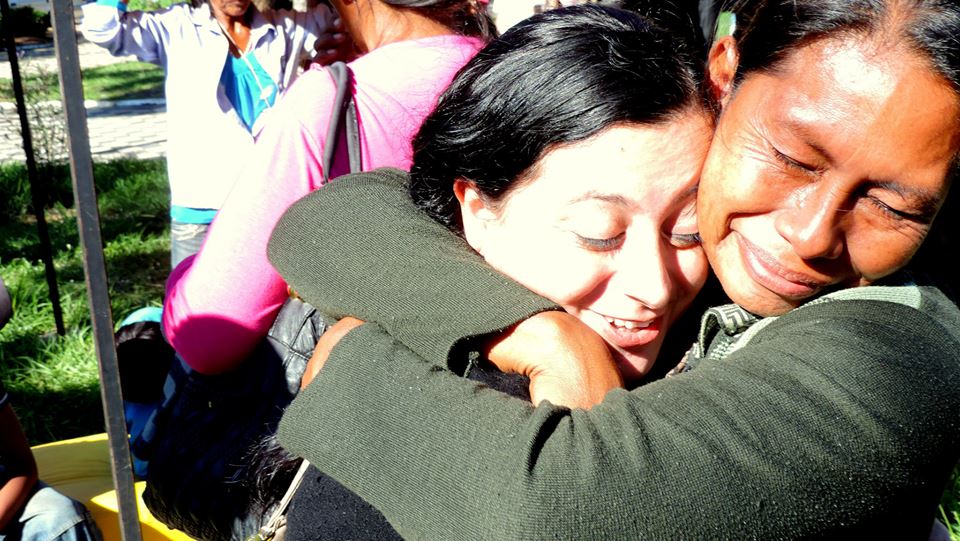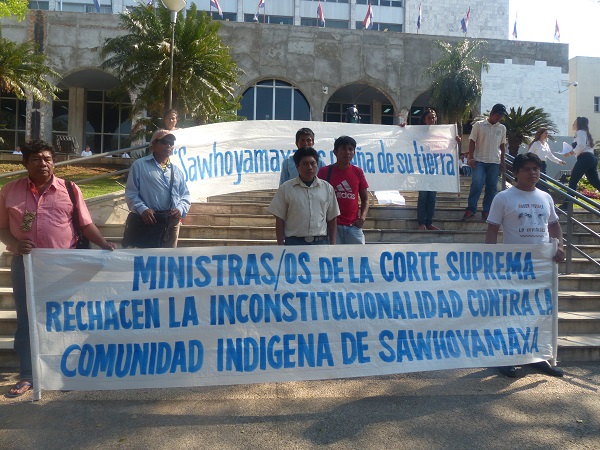Defending freedom of expression of human rights’ defenders in Paraguay
On December 9, 2015, the Paraguayan Council of Justice (Consejo de Superintendencia de Justicia) issued a decision on the administrative inquiry procedure initiated against human rights’ defender, Julia Cabello, applying a sanction of admonition (amonestación). On December 22, 2015, Tierraviva, an ESCR-Net member organization based in Paraguay, appealed from the decision, in an attempt to avoid a negative precedent against freedom of expression of human rights defenders in the country.

Photo by Adriana Lugo
Julia Cabello is an attorney who has worked for more than a decade in defense of the right to land of the Sawhoyamaxa community in Paraguay. From the 1990s, the Sawhoyamaxa community of the Enxet people has sought protection for their right to land. After exhausting all internal legal procedures in Paraguay, the indigenous people turned to the Inter-American System to protect their rights to life and land. In 2006, the Inter-American Court of Human Rights ordered the State of Paraguay to grant the indigenous community title to approximately 14,000 hectares that constitute the ancestral land of the indigenous people.
In compliance with the Court’s decision, the Paraguayan Congress expropriated 14,404 hectares of land in favor of the Sawhoyamaxa community, through Law No. 5194 of 2014. The constitutionality of the law was challenged before the Constitutional Chamber of the Supreme Court of Justice, and, in September 2014, the Court unanimously rejected the action of unconstitutionality presented against the law. With this ruling, the process focused on complying with the administrative process to title the lands in favor of the Sawhoyamaxa community.
 When the administrative proceedings were initiating, in order to comply with the order of the Inter-American Court and the law passed by the Paraguayan Congress, the President of the Constitutional Chamber of the Supreme Court of Justice, Dr. Bareiro de Módica, accepted a second action of unconstitutionality against the law that expropriated the lands in favor of the Sawhoyamaxa community. This time, the Kansol S.A and Roswell Company S.A. companies, property of Roedel, focused on article 3 of Law 5194 of 2014. This provision discussed the compensation that must be paid to the owner of the lands that were expropriated in favor of the Sawhoyamaxa people. The content of this article was already discussed and resolved when the Court considered the first action of unconstitutionality. As a result of this action, Ms. Cabello, an attorney with Tierraviva, a non-governmental organization that provides legal representation of the Sawhoyamaxa community, published a note that criticized the Court’s admission of the second action. In response, Dr. Bareiro began an administrative inquiry against her, together with the Counsel of the Superintendent of the Supreme Court. Although the Court has finally rejected the second action of unconstitutionality, the inquiry against Ms. Cabello is still underway, which has resulted in a violation of her right to freedom of expression. The sanction to which she is exposed in this inquiry, should a sanction be imposed, is the termination of her registration as a lawyer, or suspension for a year from the exercise of the legal profession.
When the administrative proceedings were initiating, in order to comply with the order of the Inter-American Court and the law passed by the Paraguayan Congress, the President of the Constitutional Chamber of the Supreme Court of Justice, Dr. Bareiro de Módica, accepted a second action of unconstitutionality against the law that expropriated the lands in favor of the Sawhoyamaxa community. This time, the Kansol S.A and Roswell Company S.A. companies, property of Roedel, focused on article 3 of Law 5194 of 2014. This provision discussed the compensation that must be paid to the owner of the lands that were expropriated in favor of the Sawhoyamaxa people. The content of this article was already discussed and resolved when the Court considered the first action of unconstitutionality. As a result of this action, Ms. Cabello, an attorney with Tierraviva, a non-governmental organization that provides legal representation of the Sawhoyamaxa community, published a note that criticized the Court’s admission of the second action. In response, Dr. Bareiro began an administrative inquiry against her, together with the Counsel of the Superintendent of the Supreme Court. Although the Court has finally rejected the second action of unconstitutionality, the inquiry against Ms. Cabello is still underway, which has resulted in a violation of her right to freedom of expression. The sanction to which she is exposed in this inquiry, should a sanction be imposed, is the termination of her registration as a lawyer, or suspension for a year from the exercise of the legal profession.
On July 28, 2015, the International Network for Economic, Social and Cultural Rights (ESCR-Net) and Dejusticia (Colombia) presented an amicus brief in the administrative inquiry proceeding against Ms. Cabello, to protect the right to freedom of expression of human rights’ defenders and the decision of the Paraguayan Council of Justice cited the amicus..
While ESCR-Net members applaud the decision to refrain from establishing more heavy penalties against Ms. Cabello, concerns have been expressed regarding the establishment of a negative precedent that could curtail the ability of human rights’ defenders to protect rights, for fear of retaliation against their freedom of expression.
